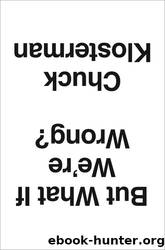But What if We're Wrong? Thinking About the Present as if It Were the Past by Klosterman Chuck

Author:Klosterman, Chuck [Klosterman, Chuck]
Language: eng
Format: epub
Tags: Philosophy, History, Science, Psychology, Sociology
ISBN: 9780399184123
Amazon: 0399184120
Goodreads: 27068734
Publisher: Penguin Press
Published: 2016-06-07T07:00:00+00:00
Donât Tell Me What Happens. Iâm Recording It.
Television is an art form where the relationship to technology supersedes everything else about it. Itâs one realm of media where the medium is the message, without qualification. TV is not like other forms of consumer entertainment: Itâs slippier and more dynamic, even when itâs dumb. We know people will always read, so we can project the future history of reading by considering the evolution of books. (Reading is a static experience.) We know music will always exist, so we can project a future history of rock ânâ roll by placing it in context with other genres of music. The internal, physiological sensation of hearing a song today is roughly the same as it was in 1901. (The ingestion of sound is a static experience.) The machinery of cinema persistently progresses, but how we watch movies in publicâand the communal role cinema occupies, particularly in regard to datingâhas remained weirdly unchanged since the fifties. (Sitting in a dark theater with strangers is a static experience.) But this is not the case with television. Both collectively and individually, the experience of watching TV in 2016 already feels totally disconnected from the experience of watching TV in 1996. I doubt the current structure of television will exist in two hundred fifty years, or even in twenty-five. People will still want cheap escapism, and something will certainly satisfy that desire (in the same way television does now). But whatever that something is wonât be anything like the television of today. It might be immersive and virtual (like a Star Trekian holodeck) or it might be mobile and open-sourced (like a universal YouTube, lodged inside our retinas). But it absolutely wonât be small groups of people, sitting together in the living room, staring at a two-dimensional thirty-one-inch rectangle for thirty consecutive minutes, consuming linear content packaged by a cable company.
Something will replace television, in the same way television replaced radio: through the process of addition. TV took the audio of radio and added visual images. The next tier of innovation will affix a third component, and that new component will make the previous iteration obsolete. I have no idea what that third element will be. But whatever it is will result in a chronological âfreezingâ of TV culture. Television will be remembered as a stand-alone medium that isnât part of any larger continuum53âthe most dominant force of the latter twentieth century, but a force tethered to the period of its primacy. And this will make retroactive interpretations of its artistic value particularly complicated.
Hereâs what I mean: When something fits into a lucid, logical continuum, itâs generally remembered for how it (a) reinterprets the entity that influenced its creation, and (b) provides influence for whatever comes next. Take something like skiffle musicâa musical genre defined by what it added to early-twentieth-century jazz (rhythmic primitivism) and by those individuals later inspired by it (rock artists of the British Invasion, most notably the Beatles). We think about skiffle outside of itself, as one piece of a multidimensional puzzle.
Download
This site does not store any files on its server. We only index and link to content provided by other sites. Please contact the content providers to delete copyright contents if any and email us, we'll remove relevant links or contents immediately.
Cecilia; Or, Memoirs of an Heiress — Volume 1 by Fanny Burney(32548)
Cecilia; Or, Memoirs of an Heiress — Volume 2 by Fanny Burney(31947)
Cecilia; Or, Memoirs of an Heiress — Volume 3 by Fanny Burney(31932)
The Great Music City by Andrea Baker(31917)
We're Going to Need More Wine by Gabrielle Union(19034)
All the Missing Girls by Megan Miranda(15960)
Pimp by Iceberg Slim(14488)
Bombshells: Glamour Girls of a Lifetime by Sullivan Steve(14058)
For the Love of Europe by Rick Steves(13932)
Talking to Strangers by Malcolm Gladwell(13350)
Norse Mythology by Gaiman Neil(13349)
Fifty Shades Freed by E L James(13233)
Mindhunter: Inside the FBI's Elite Serial Crime Unit by John E. Douglas & Mark Olshaker(9324)
Crazy Rich Asians by Kevin Kwan(9280)
The Lost Art of Listening by Michael P. Nichols(7494)
Enlightenment Now: The Case for Reason, Science, Humanism, and Progress by Steven Pinker(7306)
The Four Agreements by Don Miguel Ruiz(6745)
Bad Blood by John Carreyrou(6611)
Weapons of Math Destruction by Cathy O'Neil(6267)
